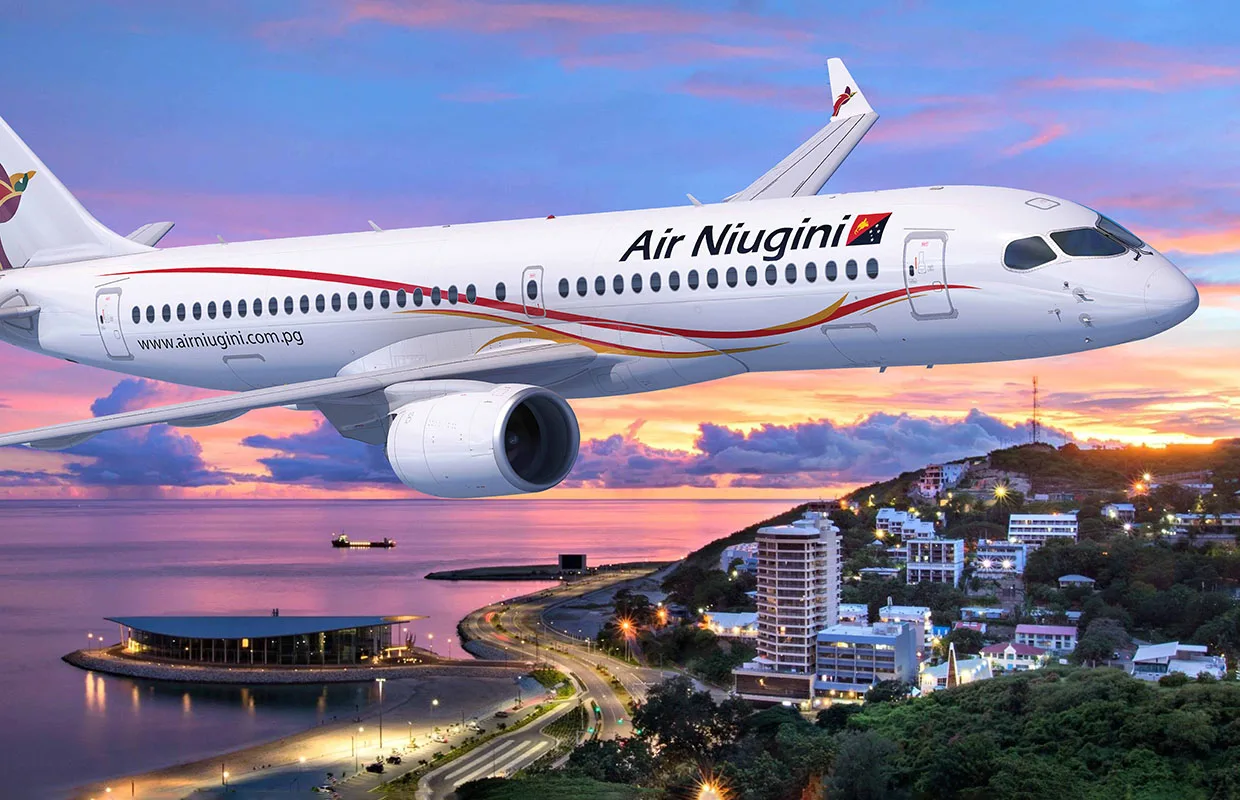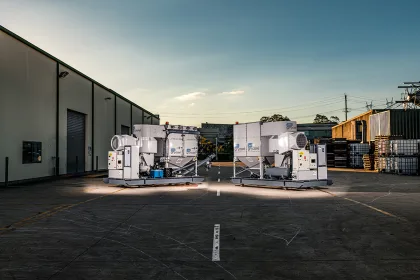Embarking on the major expansion and modernisation of its aircraft fleet, we speak to David Glover, CCO of Air Niugini, about the airline’s ambitious plans for the future that will continue to put Papua New Guinea on the global aviation map.
FLYING THE PNG FLAG
The emergence of commercial aviation was crucial to the development of Papua New Guinea (PNG) in the latter half of the 20th century.
The founding of the country’s national airline, Air Niugini, in September 1973 proved to be a catalyst for PNG’s growth after it gained independence two years later.
Indeed, the airline’s inaugural flight, which took place on 1st November 1973 from the capital of Port Moresby to Lae, marked a turning point in the nation’s subsequent socioeconomic development, and a number of international services quickly followed.
Over 50 years later, Air Niugini has achieved the illustrious position of national flag carrier and the country’s premier airline, being 100 percent government-owned.
“With a proud history spanning more than five decades, we have established ourselves as a vital link between PNG and the rest of the world,” introduces CCO, David Glover.
Indeed, in a country where the major population centres are still largely unconnected by road, Air Niugini operates a comprehensive network of domestic and international routes that link major cities, towns, and remote regions across PNG.

“With a proud history spanning more than five decades, we have established ourselves as a vital link between PNG and the rest of the world”
David Glover, CCO, Air Niugini
MEETING THE NEEDS OF A NATION
The critical role that Air Niugini plays is demonstrated by the country’s diverse geography, ranging from cloud-covered mountains to tropical coastal and island provinces, which make for a challenging environment in which to operate efficient and reliable airline services.
PNG and its aviation industry tackle unpredictable weather patterns on a daily basis throughout the year, not to mention the country’s susceptibility to natural disasters such as floods, landslides, volcanic eruptions, and earthquakes.
In addition, PNG presently has limited aviation infrastructure. Its runways in many regional centres are short, face incredibly hot temperatures, and some are at high altitudes with limited navigational aids. This is further compounded by unpredictable and unreliable supplies of fuel, water, and power. All of these factors combine to present the airline with a unique set of challenges unlike any other country in the world.
Despite these obstacles, Glover maintains a positive outlook on PNG’s aviation industry.
“The future as a whole is bright because PNG is a country rich in natural resources such as oil, gas, gold, and other minerals and is still relatively untouched by tourism. All these sectors rely on the support of the aviation industry in order to operate and prosper,” he insights.
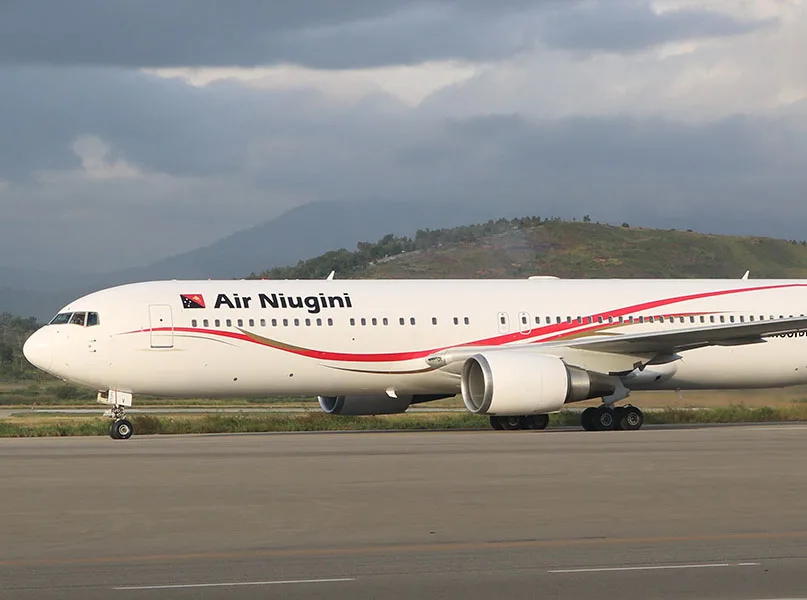
Air Niugini connects these key industries through a comprehensive network of domestic flights to 22 regional centres across PNG from the capital.
“The government has already embarked on a programme to upgrade airport infrastructure throughout the country, which is a very welcome and overdue development and adds to the airline’s sense of optimism for the future.”
The company is also proud to connect PNG to key neighbouring destinations, flying to Brisbane, Cairns, and Sydney in Australia, Manila in the Philippines, as well as Singapore, Hong Kong, the Solomon Islands, Fiji, and Vanuatu.
These services also provide the country with a vital link to the region and the world, and this responsibility was never more proven than during the COVID-19 pandemic, when Air Niugini was the only airline providing these crucial international passenger and freight connections for over two years.
Through its extensive domestic and regional network, the company aspires to be the leading airline in the Pacific and is dedicated to delivering exceptional service, promoting tourism, and connecting people, cultures, and economies.
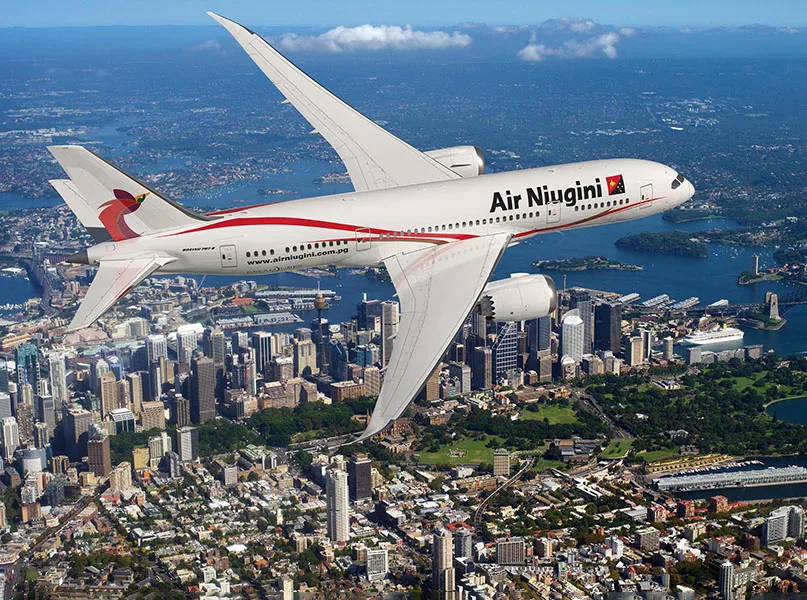
“Whilst we acknowledge there have been many challenges over a period of time, we are committed to providing an excellent service, both in the air and on the ground. Our dedicated team strives to make every journey comfortable, convenient, and memorable for passengers,” Glover insights.
Integrated into its commercial passenger flights, Air Niugini boasts a significant cargo operation using its wide-body Boeing 767s.
These extremely capable aircraft provide critical freight capacity for the movement of mining equipment, oil and gas machinery, spare parts, medical supplies, food, vehicle components, high-tech goods, and other commodities.
Aside from these mainly imported goods, the Boeing 767s also carry large quantities of PNG exports – including live and fresh seafood (crabs, lobsters, beche-de-mer, and others), vanilla, and other valuable products – to the markets of Asia and beyond.
“Our dedicated team strives to make every journey comfortable, convenient, and memorable for passengers”
David Glover, CCO, Air Niugini
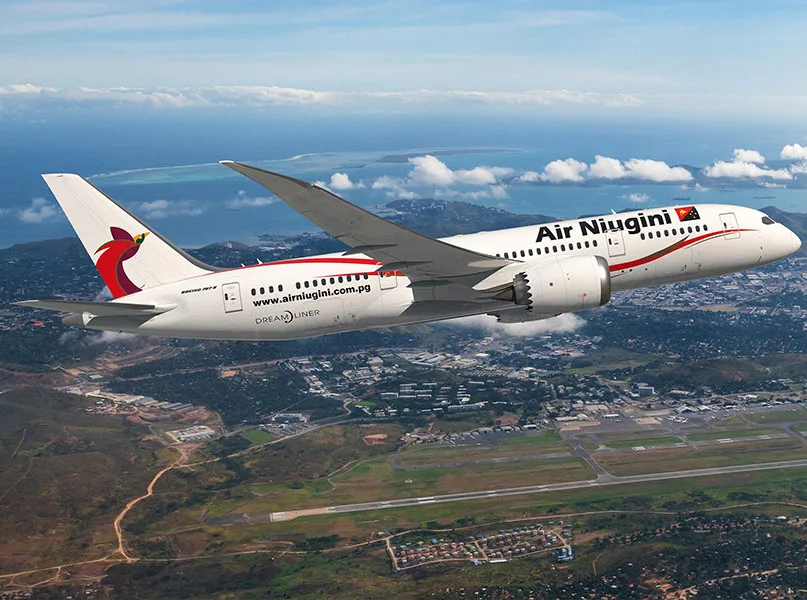
RE-FLEETING FOR EXCELLENCE
Air Niugini’s future plans and expansion are supported by the largest re-fleeting programme in its history. In fact, it is the biggest capital expenditure programme ever in the country’s aviation industry.
Launched in 2023, 60 percent of its core fleet, which is now over 30 years old, is being replaced by brand-new aircraft in a visionary five-year project.
At the heart of the re-fleeting project is the purchase agreement signed with Airbus in November 2023 for six Airbus A220 regional jets, which subsequently increased to eight.
The Airbus A220s will replace the airline’s ageing Fokker 100/70 and Boeing 737 aircraft types. The Fokker family of aircraft has been synonymous with Air Niugini’s development for the last 50 years, however, the time has now come for these aircraft to be replaced.
This was a major milestone in the airline’s re-fleeting programme as A220 aircraft are equipped with state-of-the-art facilities, which will mark a significant transformation in Air Niugini’s passenger experience.
For example, the aircraft have wider cabins with larger windows to provide more natural light and are fitted with more comfortable seats in business and economy class.
Alongside guaranteed relaxation, the A220 will be the first in Air Niugini’s fleet to offer Wi-Fi connectivity for passengers, enabling them to stay in touch with family, friends, and colleagues and use social media platforms whilst they fly.
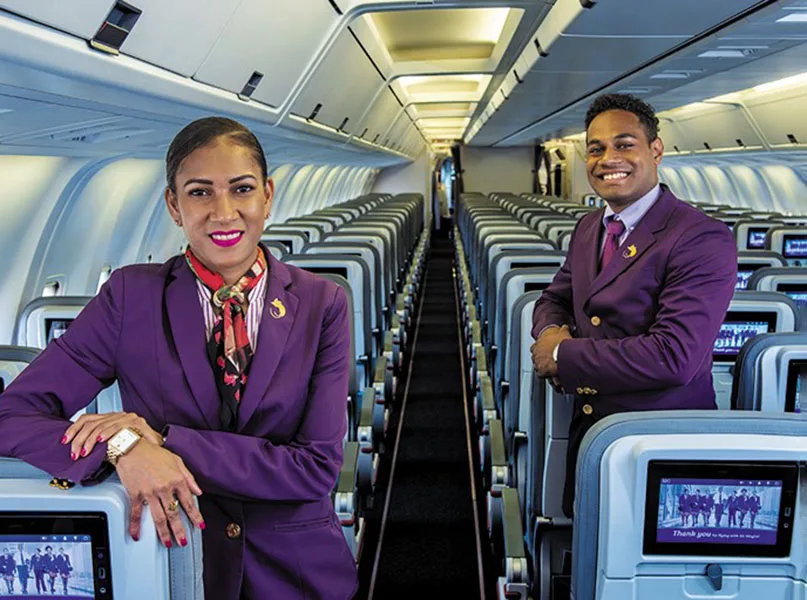
Other airliners being switched out include the De Havilland Canada Dash 8s, which are being replaced by newer Bombardier Aerospace Q400s. The first of the additional Q400 aircraft arrived in Port Moresby in October last year.
Meanwhile, the introduction of two new Boeing 787 Dreamliners in 2027 will replace the two 767s currently used for regional routes to Asia and Australia and will provide 20 percent more seat and cargo capacity.
“Whilst the number of aircraft in the fleet at the end of this programme will remain unchanged at 24, the new aircraft will be 15 to 30 percent larger, which, when combined with better reliability and fuel efficiency, means they will be able to operate at higher utilisation rates,” affirms Glover.
Additionally, Air Niugini is working with aircraft manufacturers on training, spares packages, and other programmes to ensure the smooth introduction of its new fleet.
As such, the re-fleeting programme will garner many positive results for the company, such as expanding its passenger and freight capacity, allowing Air Niugini to take advantage of economic growth driven by current and future resource industry projects, and advance PNG’s fledgling tourism industry.
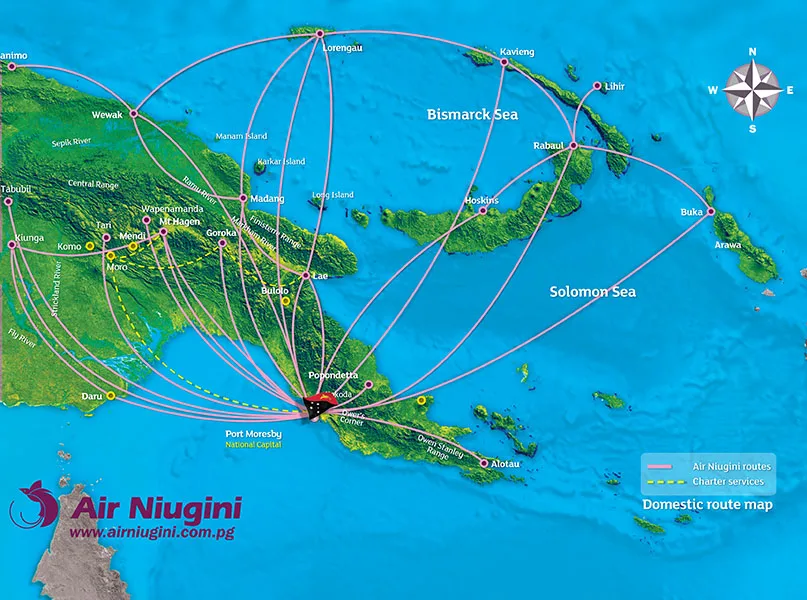
SEAMLESS GLOBAL CONNECTIONS
As a regional airline, it is vital that Air Niugini works with other carriers to ensure smooth passenger journeys.
The company is, therefore, developing a range of codeshare agreements and inter-airline arrangements with a number of carriers.
The company already codeshares with Cathay Pacific, Solomon Airlines, and Qantas, with more to follow soon, and boasts over 40 inter-airline agreements that allow through-ticketing of passengers.
“These will be the key for us to boost our passenger numbers and revenue, allowing us to fill the extra capacity offered by the new fleet as it arrives,” Glover highlights.
Whilst operating a comprehensive network with neighbouring airlines, the strength of a reliable and efficient supply chain is just as important for Air Niugini, granting it easy access to an inventory of spare parts from overseas and maintenance facilities when they are needed.
This is particularly advantageous for the airline given its remote location and distance from major aircraft parts suppliers in North America and Europe. As a result, it can take time for spare parts to reach Air Niugini from abroad.
Any additional delays caused by the lack of available flight connections and a limited supply chain, therefore, become even more critical to the airline’s operations.
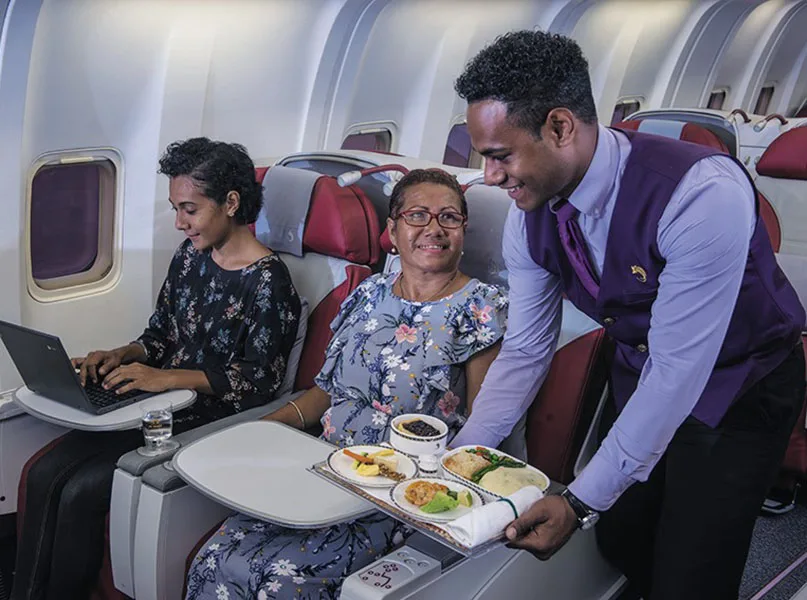
THE SUCCESS OF STAFF
Air Niugini’s ability to fly high in Asia Pacific’s airline industry is largely down to the dedication of its 2,200-strong workforce, the vast majority of whom are PNG nationals.
With their well-being and professional development in mind, the company has a comprehensive staff training programme.
“When the airline emerged from the challenges of the COVID-19 pandemic in 2022, we immediately embarked on company-wide training programmes, focusing on customer service and the development of our emerging future leaders,” Glover tells us.
Still continuing today, the programme empowers the company’s employees to confidently take on more challenging roles throughout the organisation.
“If staff are engaged, confident, and happy in their work, this flows through to our customers.”
Furthermore, Air Niugini’s community outreach comprises a number of environmental projects, such as mangrove planting, which took place last year. The airline also regularly assists with the transportation of vital medical equipment and medicines to remote areas, often at short notice.
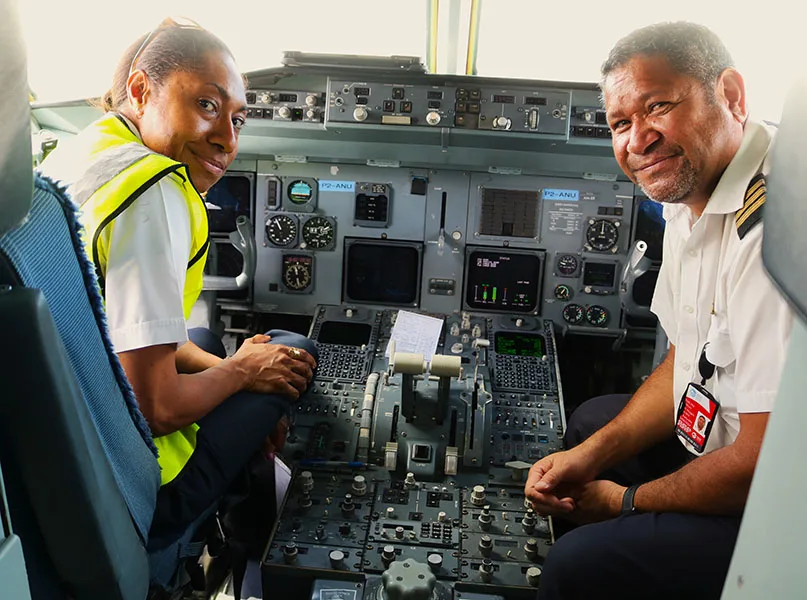
In addition, the company has embarked on a programme to replace all single-use plastics from its aircraft fleet with more environmentally-friendly solutions.
On top of career advancement opportunities and environmental initiatives, the safety of employees is also of paramount importance to Air Niugini.
Indeed, the company maintains rigorous standards, adheres to international regulations, and continuously invests in training and technology to ensure the highest levels of passenger and crew safety.
Looking ahead to 2025, Air Niugini highly anticipates the arrival of its new fleet, with the coming of the first A220 coinciding with the 50th anniversary of PNG’s independence in September.
This will be a major event for the airline, which will be supported by the roll-out of various digitalisation activities and expansion projects.
“Our initial focus will be on strengthening and improving our domestic operations. However, from 2026 onwards, once the new fleet is here in sufficient numbers, we will enhance our international schedule and potentially expand our route network to take advantage of the superior operating economics that the A220s will bring,” Glover concludes.



